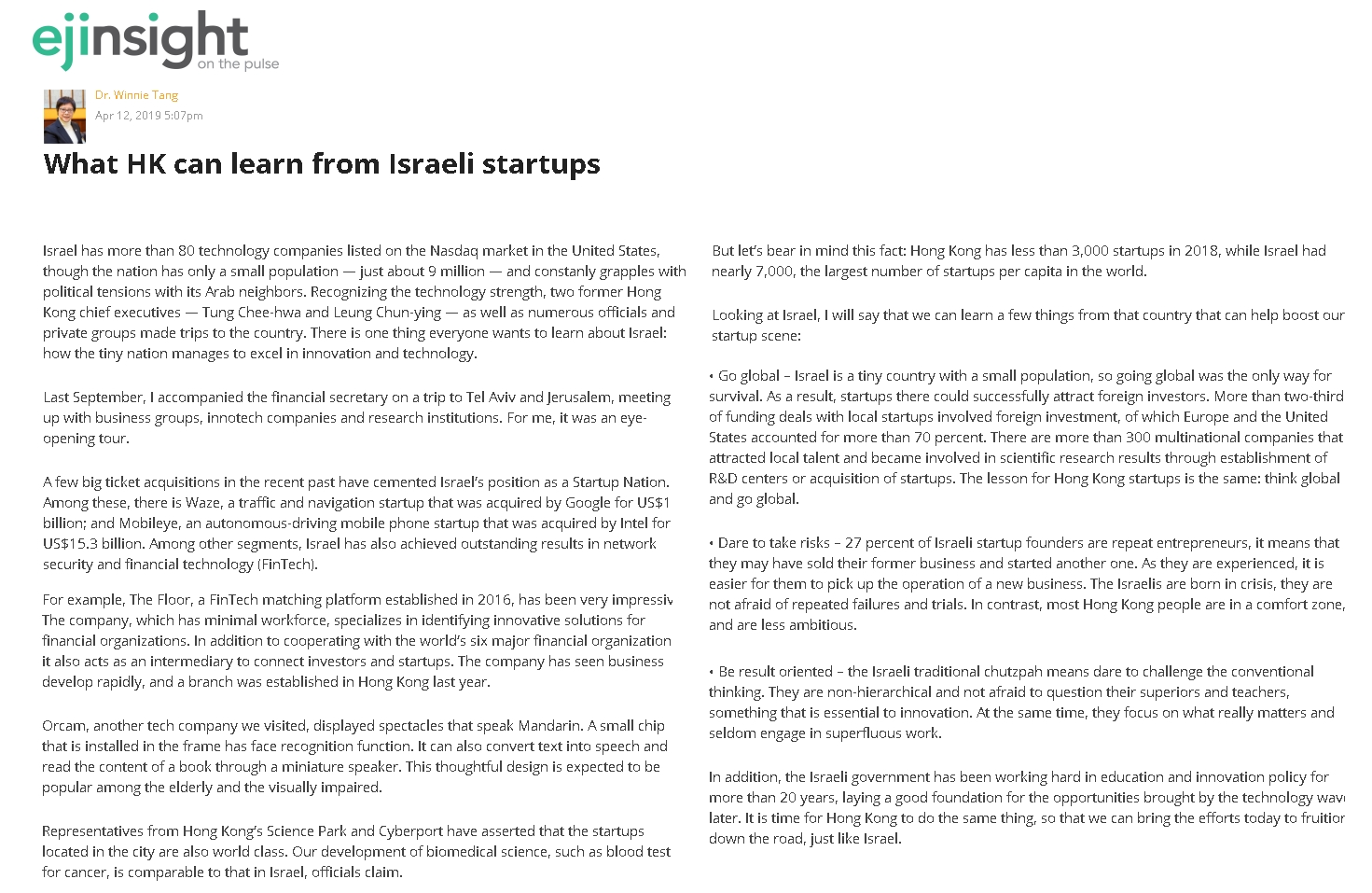網上版請按此

What HK can learn from Israeli startups
Israel has more than 80 technology companies listed on the Nasdaq market in the United States, though the nation has only a small population — just about 9 million — and constanly grapples with political tensions with its Arab neighbors. Recognizing the technology strength, two former Hong Kong chief executives — Tung Chee-hwa and Leung Chun-ying — as well as numerous officials and private groups made trips to the country. There is one thing everyone wants to learn about Israel: how the tiny nation manages to excel in innovation and technology.
Last September, I accompanied the financial secretary on a trip to Tel Aviv and Jerusalem, meeting up with business groups, innotech companies and research institutions. For me, it was an eye-opening tour.
A few big ticket acquisitions in the recent past have cemented Israel's position as a Startup Nation. Among these, there is Waze, a traffic and navigation startup that was acquired by Google for US$1.3 billion; and Mobileye, an autonomous-driving mobile phone startup that was acquired by Intel for US$15.3 billion. Among other segments, Israel has also achieved outstanding results in network security and financial technology (FinTech).
For example, The Floor, a FinTech matching platform established in 2016, has been very impressive. The company, which has minimal workforce, specializes in identifying innovative solutions for financial organizations. In addition to cooperating with the world's six major financial organizations, it also acts as an intermediary to connect investors and startups. The company has seen business develop rapidly, and a branch was established in Hong Kong last year.
Orcam, another tech company we visited, displayed spectacles that speak Mandarin. A small chip that is installed in the frame has face recognition function. It can also convert text into speech and read the content of a book through a miniature speaker. This thoughtful design is expected to be popular among the elderly and the visually impaired.
Representatives from Hong Kong's Science Park and Cyberport have asserted that the startups located in the city are also world class. Our development of biomedical science, such as blood test for cancer, is comparable to that in Israel, officials claim.
But let's bear in mind this fact: Hong Kong has less than 3,000 startups in 2018, while Israel had nearly 7,000, the largest number of startups per capita in the world.
Looking at Israel, I will say that we can learn a few things from that country that can help boost our startup scene:
• Go global – Israel is a tiny country with a small population, so going global was the only way for survival. As a result, startups there could successfully attract foreign investors. More than two-thirds of funding deals with local startups involved foreign investment, of which Europe and the United States accounted for more than 70 percent. There are more than 300 multinational companies that attracted local talent and became involved in scientific research results through establishment of R&D centers or acquisition of startups. The lesson for Hong Kong startups is the same: think global and go global.
• Dare to take risks – 27 percent of Israeli startup founders are repeat entrepreneurs, it means that they may have sold their former business and started another one. As they are experienced, it is easier for them to pick up the operation of a new business. The Israelis are born in crisis, they are not afraid of repeated failures and trials. In contrast, most Hong Kong people are in a comfort zone, and are less ambitious.
• Be result oriented – the Israeli traditional chutzpah means dare to challenge the conventional thinking. They are non-hierarchical and not afraid to question their superiors and teachers, something that is essential to innovation. At the same time, they focus on what really matters and seldom engage in superfluous work.
In addition, the Israeli government has been working hard in education and innovation policy for more than 20 years, laying a good foundation for the opportunities brought by the technology wave later. It is time for Hong Kong to do the same thing, so that we can bring the efforts today to fruition down the road, just like Israel.
Dr. Winnie Tang
Adjunct Professor, Department of Computer Science, Faculty of Engineering and Faculty of Architecture, The University of Hong Kong